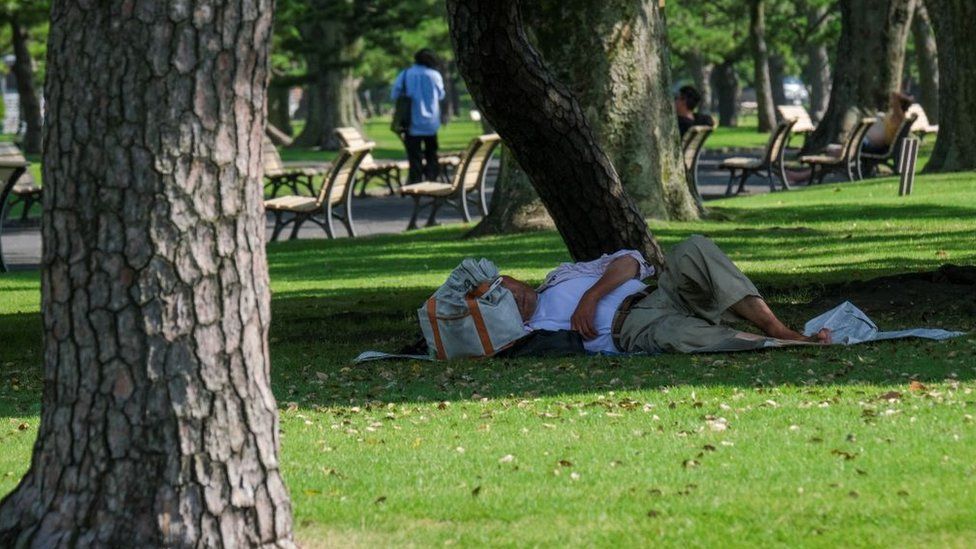Masaya Maruyama, his wife Junko and his brother Koichi, were sitting under the tailgate of their work van, trying to find a tiny bit of shade, as they drank profusely from large bottles of orange soda.
The family of plumbers had been out in the baking sun laying pipes since 08:00 local time. By 11:00, the temperature at the construction site in Isezaki was hovering around 42C.
“It got up to 47C the other afternoon,” Mr Maruyama says.
When asked how he manages to work in such sweltering temperatures, he says: “It’s scary, I’ve never seen anything like this before.”
The three of them are all wearing jackets that have built-in electric fans that blow cool air around their bodies. But it seems barely adequate.
For many in Japan, the heat over the last few days feels strange, and rather frightening. This should be the middle of the country’s rainy season. But across Japan the skies are clear, and the mercury is stuck in the high 30s and has twice broken through 40C this week.
And that’s just the official temperature – out of the shade it’s often much hotter.
Even though summer has barely begun, 263 places across Japan have seen temperature records broken in the last six days, according to meteorologist Sayaka Mori.
Tokyo on Thursday touched 36.4C – the highest temperature ever recorded in the capital in June dating back to 1875.

Japan is not alone in suffering from the heat right now.
But what is perhaps surprising is that Japan is struggling to keep the lights and air conditioners running. On Tuesday, as electricity demand hit its early evening peak, output was at 97% of capacity. That is alarmingly close to triggering blackouts.
Japan’s government has been making pleas for people to “switch off” as many lights and electrical devises as possible. But at the same time, it is also warning people not to switch off their air conditioners.
Their fear is of a repeat of 2018, the last time Japan was hit by a sustained heatwave. Then, dozens of mainly elderly people died from heat stroke and more than 22,000 people ended up in hospital.
To try to prevent that local governments are opening “cool down” centres, where elderly residents can take refuge.
In the Sumide district in northern Tokyo, 86-year-old Kiyoji Saito is playing Shogi (Japanese chess) with a group of other octogenarians.
Like many elderly Japanese he really doesn’t like using the air conditioner.
“It is costing me three or four thousand yen [$21-$30; £18-£25] for a month for electricity this year,” he says. “It’s great they have this place we can come during the day, meet up and stay cool.”
Across the table 81-year-old Yukimasa Nakano says he is rationing his aircon use to one hour in the morning, and three hours in the evening.
“In all my eight decades I have never felt heat like this before in June,” he says.
“I live alone so using the aircon feels like such a waste,” says Kiyoji Saito, another member in the chess group. “But if I don’t, in this heat I might die.”






